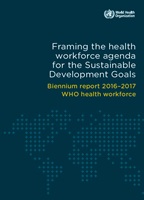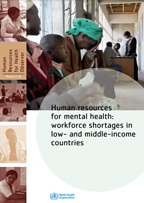About us
Health systems can only function with health workers; improving health service coverage and realizing the right to the enjoyment of the highest attainable standard of health is dependent on their availability, accessibility, acceptability and quality.
WHO estimates a projected shortfall of 11.1 million health workers by 2030 (1), mostly in low- and lower-middle income countries. However, countries at all levels of socioeconomic development face, to varying degrees, difficulties in the education, employment, deployment, retention, and performance of their workforce.
The chronic under-investment in education and training of health workers in some countries and the mismatch between education and employment strategies in relation to health systems and population needs are contributing to continuous shortages. These are compounded by difficulties in deploying health workers to rural, remote and under-served areas. Moreover, the increasing international migration of health workers may exacerbate health workforce shortfalls, particularly in low- and lower-middle income countries.
In some countries, challenges in universal access to health workers may also result from the lack of fiscal space to absorb the supply of health workers. As a result, some countries face the paradox of health worker unemployment co-existing with major unmet health workforce needs.
The High-Level Commission on Health Employment and Economic Growth found that investments in the health and social workforce can spur inclusive economic growth. The health workforce has also a vital role in building the resilience of communities and health systems and in emergency preparedness and response. Approximately 67% of the health workforce are women: investing in the health workforce is an opportunity to create decent employment opportunities, in particular for women and youth.
Our Team
All->Events
Call for consultation
Normative publications

This report showcases selected examples of the actions and commitments made during 2016 and 2017, hoping to provide an inspiration for renewed and expanded...

Human resources for mental health: workforce shortages in low- and middle-income countries
Mental, neurological and substance use (MNS) disorders account for an estimated 14% of the global burden of disease, yet mental health routinely receives...
Policies and practices of countries that are experiencing a crisis in human resources for health: tracking...
In order to understand and monitor the progress in developing and implementing HRH policies in the 57 countries experiencing a critical deficit in the...
Efficiency and effectiveness of aid flows towards health workforce development - Exploratory study based...
Over the last decade, it has become increasingly clear that the health workforce deficit is an important obstacle to achieving the Millennium Development...
Additional publications
Health topics
Related teams

